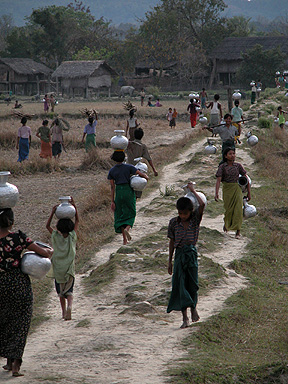BURMA
(1)
and Support the Country's Military Regime.
Burma is
located at the western edge of Southeast Asia. It is 1.8 times the
size of Japan, with a population of around 52 million. It is a multiracial
nation
of more than 40 ethnic groups. In Japan, however, little is known about
the
country, apart from the longstanding confrontation between the ruling
military regime and pro-democracy leader Aung San Suu Kyi.
In the remote regions of this poorly understood country, women belonging
to
various ethnic minority groups are forced to submit to severe - indeed,
bizarre -
traditional cultural practices. The Panthay people, for instance, engage
in foot-
binding, a custom introduced from southern China. On the Thai border,
women
of the Padaung race have brass rings placed around their necks from childhood,
earning them the name of the glong-necked peopleh (although in fact their
shoulders have been forced down, so that their necks only look longer).
And in
Chin State, near neighboring Bangladesh, I have caught sight of women
with
tattooed faces.
This custom, which is completely unknown outside of Burma, was started
by
parents who chose to forcibly disfigure their daughters rather than see
them
abducted by powerful Indian or Burmese clans. The practice is said to
have died
out, and supposedly only women over the age of forty can still be seen
with the
tattoos. But in one Chin village that I secretly entered, I saw a twenty-year-old
girl whose face had been tattooed.
Because Burma is ruled by a military regime, the flow of information is
strictly
controlled. Like Burmese citizens, foreigners find that their freedom
to move
about the country is extremely limited. However, in the face of economic
sanctions imposed upon it by Western countries, Burma has begun to develop
its tourism industry in an effort to shore up its foreign currency reserves.
Every place has its own unique customs. It is not for outsiders to judge
them
one way or another. My concern is that there are people who will exploit
women
whose faces have been tattooed against their will by treating them as
mere
objects of curiosity. In fact, tour operators licensed by the regime are
already
entering Chin State, which they are billing as a remote, exotic destination.
Burmafs military regime is despised by the vast majority of the countryfs
citizens.
Can we justify traveling to such a country simply to satisfy our curiosity,
without
giving a thought to the lives of local people?

|
A
Chin village. From dawn until dusk, every person - adult or
child, man or woman - who is not otherwise engaged is busy fetching water. |
|
|